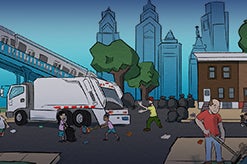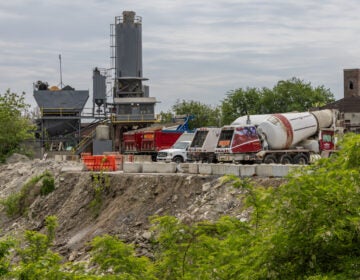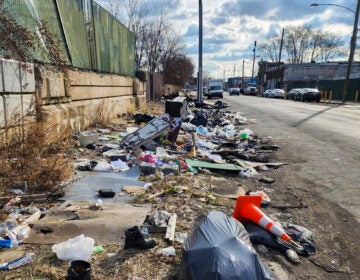Sanitation Solutions: How hidden cameras became Philly’s fiercest weapon in the war on dumping
Philadelphia has 300 surveillance cameras and, increasingly, sees them as central to its strategy of holding individuals accountable for illegal dumping.
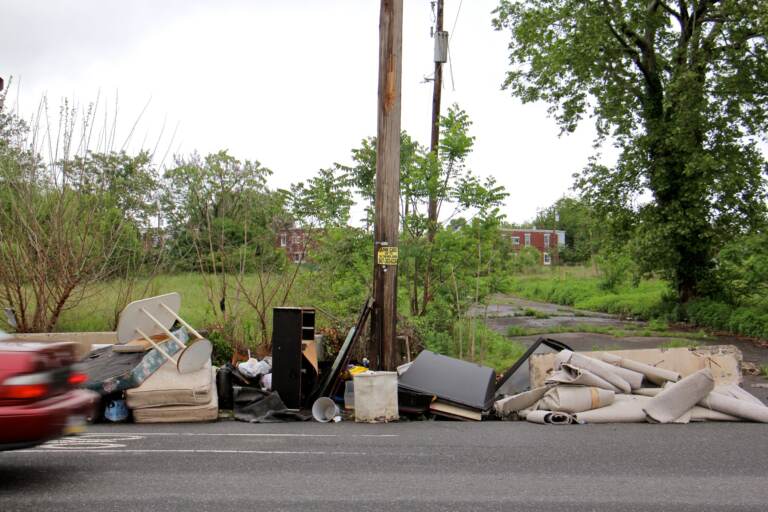
Household trash dumped on Wyoming Avenue. (Emma Lee/WHYY)
As Brenda Kennedy told an audience of city officials and television cameras how overjoyed she was to see her block finally cleaned, a pile of industrial trash bags and dead plants filled the nearby sidewalk on the 3600 block North Percy Street. For years, she had watched as random trucks deposited piles of old tires, trash, and salvage on her block.
“It could be someone’s trash that starts a disease, but if we work together to make sure those people recycle their stuff and care about their neighborhood, we can get something done,” said Kennedy, a block captain, during a 2018 press conference that kicked off a new phase in the city’s battle against illegal dumping.
Mayor Jim Kenney, Streets Commissioner Carlton Williams, Council President Darrell Clarke, and other officials surrounded Kennedy. Behind them, sanitation workers and a truck waited for a cue to clean up the illegally dumped refuse.
“What we learned is, cleaning up’s not enough. Going to vacant lots and cleaning them up, over, and over, and over again… It doesn’t work,” Mike DiBerardinis, the city’s managing director at the time, said.
“We had to get to a place where we can reduce the flow of litter,” DiBerardinis continued, “and then prosecute folks when we catch them.”
To discourage and punish offenders, the Streets Department was expanding its use of surveillance cameras at dumping hotspots, he explained. The agency installed 15 new, high-end devices in 2018 and gradually increased the number, first to 50 and then to 100.
The new cameras, which cost $4,000 each, soon showed their worth. The District Attorney’s office prosecuted 31 dumping cases in 2019, won 10 guilty verdicts or pleas, and resolved seven cases through misdemeanor diversions. Judges ordered defendants to pay almost $8,000 and serve 302 hours of community service.
“We had real numbers and real evidence that was showing people getting their vehicles impounded, major fines, and having to pay restitution,” recalled Nic Esposito, former director of the city’s Zero Waste and Litter Cabinet, which helped coordinate anti-dumping work by several city agencies. “We were really jamming on getting people connected.”
Esposito says the stepped-up enforcement resulted in major improvements, as measured by the volume of material crews collected during cleanups of heavy illegal dumping. In 2019, they collected 6,808 tons, a 3.5% drop from the previous year and fully 40% less than in 2016, according to data from the Zero Waste cabinet.
Achieving that progress required much more than simply installing more cameras. That had been done before: the community group PhilaPride started surveilling litter hotspots in 1999, and the city was using cameras to catch violators as long ago as 2009. Footage was also available from hundreds of security cameras controlled by the police, businesses, and civic organizations.
But, Esposito said, in recent years the devices were not being used effectively.
“You can put all the cameras you want all over the place. If no one’s checking the cameras, no one could actually get the footage, and then no one actually can do anything with the footage. They’re useless,” he said.
In 2018, however, City Council toughened penalties, and Kenney and DeBerardinis got behind a new, interdepartmental anti-dumping effort. The police department revived its environmental crimes unit, prosecutors worked with officers to charge the companies and individuals behind the dumping, and judges were persuaded not to throw cases out of court. Hundreds of investigations were launched.
“We set up the system in the cabinet that actually got the DA’s office, the police, and the managing director’s office all to work together,” Esposito said. “That took a lot of coordination, and a lot of work, and a lot of thought.”
Collaboration is key
As Brenda Kennedy observed on her Hunting Park block, illegal dumping and blight are public health problems. In addition to disease, higher rates of violence, depression, and gun violence have all been linked to neglected public space.
A study by researchers from Columbia University and the University of Pennsylvania found that cleaning and fixing up vacant lots in Philadelphia led to less crime, more socializing outdoors, and increased perceptions of safety in the surrounding neighborhood.
For decades, cities across the country have been using surveillance photos and videos to deter dumpers. San Francisco set up a program in 2006, Baltimore in 2009, Houston in 2016, St. Louis in 2018, and Camden in 2019.
Cameras are used in Los Angeles and Washington, D.C., and new devices were recently installed in New York, Pittsburgh, and Paterson, New Jersey. The nonprofit group Keep Pennsylvania Beautiful has 10 sets of cameras it sets up at dumping hotspots around the state.
U.S. cities had installed more than 1,000 still-photo cameras to discourage illegal dumping and graffiti as of 2010, according to Q-Star Technology, the company that provided Philadelphia’s first cameras 12 years ago. A device used in some places barked “Stop!” and other commands when it detected a person in a no-go zone. It was such an effective deterrent that cities didn’t bother collecting the photos, the company said.
Video cameras have been used more frequently in recent years, with footage either stored for later retrieval or streamed to a central monitoring location via Wi-Fi. But whatever technology is deployed, it only leads to cleaner streets if it is part of a comprehensive program supported by residents and multiple levels of government, experts say.
“Laws are ineffective without a commitment from high-level authorities for enforcement,” an Environmental Protection Agency dumping-prevention guidebook says. “Police officers must have the support of their command, and the police department must have the support of the court system.”
“In addition, if illegal dumping is not viewed as a priority and little action is taken, residents become frustrated and stop contacting police or local officials to report problems,” the document says. It also calls for creation of an illegal dumping task force of relevant officials.
In Philadelphia, that task force was the Zero Waste cabinet created in late 2016. Only 16 dumping cases had gone to trial that year and just four were successfully prosecuted.
After the cabinet got to work, City Council increased the minimum fine for a first dumping offense from $100 to $1,000, with a second offense bringing a $1,500 fine and third offense up to $2,000. The cameras were set up and a staffer was assigned to track the evidence coming in from surveillance videos and 311 calls.
Police investigators worked to hunt down sources of dumped trash using business names captured from the sides of vehicles and other identifying information.
“What you want to do is have the mechanisms to actually do real investigations. Who’s telling that person to dump? Why is it happening?” Esposito said.
“Our detective would go out and shake down the cases and see what they could find. Once he found something, he would then work with the DA’s office and the charging unit to bring evidence for us to say, ‘Okay, this is the truck, this is the person, this is the evidence to actually build a real case,’” he said.
Depending on the evidence provided, prosecutors could select among appropriate charges for those found responsible for the dumping, Kyle Lewis, the director of the city’s recycling program, said.
“It takes a lot of coordination between a lot of law enforcement. It’s not that every case can be brought for criminal penalties. For some, we’re looking at going with civil restitution. Some, we’re looking at civil forfeiture. We are really trying to make sure that as many cases are distributed to all of those different routes of accountability as possible,” Lewis said.
City officials made a point of publicizing their work, “putting people on notice that you will get arrested if you do illegal dumping, and we are going to hit you hard,” Esposito said.
In June 2019 they held a second press conference to tout the successful crackdown. “The message is, stop it,” said Brian Abernathy, who took over as managing director after DeBerardinis retired. “We’re not going to tolerate illegal dumping in our community any more. We’re not going to tolerate businesses who are going to dirty our quality of life and threaten our public safety.”
Heightened public awareness may have encouraged more residents to believe it was worth the effort to report dumping. Service requests for illegal dumping to the city’s 311 system jumped 23% in 2018 compared to the previous year and another 7% in 2019.
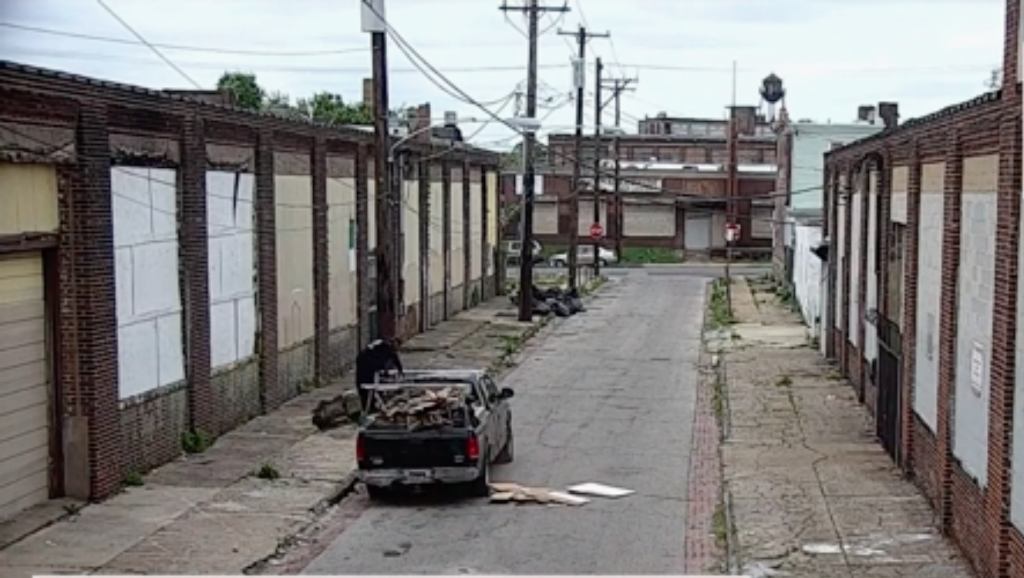
A pandemic crunch
Hotspot surveillance efforts tend to encounter a few common problems. In some cities, dumpers have shot out cameras, although that has not been a significant issue in Philadelphia. Violators try to escape detection by shifting to new sites, which can be addressed by relocating mobile cameras in response to 311 calls.
Processing the huge volume of footage generated by dozens of cameras can also pose a major challenge. According to a University of Pennsylvania study of the city’s anti-dumping effort, police would learn about dumping incidents in various ways, ask the Streets Department to send over a relevant segment of footage, and then try to scan through hours of video.
“Nobody has the time to sit through 72 hours of footage, even at high speed, trying to track when the dump happened,” Esposito said.
In response to a request for help from cabinet member Daniel Hopkins, a Penn political science professor, three college students spent 6 months developing a computer algorithm that could scan hours of video in seconds and detect objects like trash bags and tires. The city also set up legal and privacy guidelines for use of the video.
Then COVID-19 hit the city in 2019. A staffing crisis left the Streets Department struggling to collect even regular household trash on schedule, and Lewis said the agency lessened its focus on dumping and other programs. Citing pandemic-related budget problems, Kenney eliminated the Zero Waste & Litter Cabinet entirely last year, ending its coordination of the different departments’ anti-dumping work.
Police arrests for illegal dumping dropped sharply, down to 13 in 2020 and just two in the first nine months of 2021, according to the District Attorney’s office. Last year, four cases were scheduled for trial and 3 for misdemeanor diversion, with 6 others dismissed or withdrawn. The police department did not respond to requests for comment.
The amount of material collected during illegal dumping cleanups fell sharply again in 2020, decreasing 26% to 5,053 tons. That could be read as a sign of progress, but pandemic-related changes in trash generation and disposal and in Streets Department operations make the significance of the drop unclear.
Lewis says the department nonetheless remains committed to the anti-dumping program. It has continued to purchase cameras, including 51 in the 2020-2021 fiscal year. Streets now has about 300 of the devices, 250 of which are installed and in use, she said.
Lewis also said the city has recently renewed its focus on holding dumpers accountable, whether by using camera surveillance or asking residents to report dumping and help identify violators. Their participation is a key element in the ongoing work of cleansing and beautifying the city’s neighborhoods, she said.
“There’s no one magic solution for most of the challenges that any major metropolitan city has,” Lewis said. “Part of that is the cameras, getting the video out to the public. And it’s looking at how do we foster community pride so that this doesn’t happen in the first place.”
This article is part of Sanitation Solutions, a series supported by the Solutions Journalism Network. Join I Love Thy Hood’s Mathew George and others for a virtual discussion on Wednesday about how to solve Philadelphia’s dirty streets problem.

Subscribe to PlanPhilly
WHYY is your source for fact-based, in-depth journalism and information. As a nonprofit organization, we rely on financial support from readers like you. Please give today.





